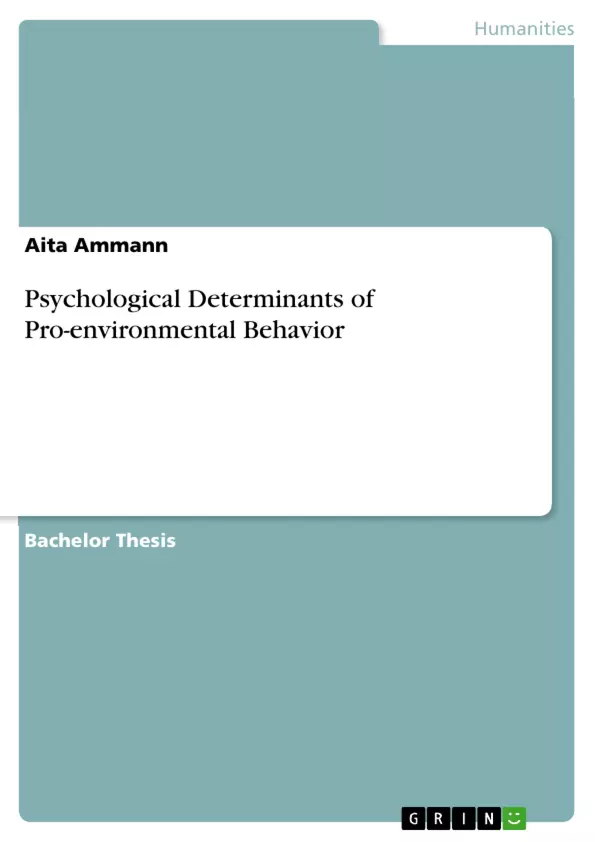This paper aims at providing a comprehensive overview of all the psychological constructs relevant for pro-environmental behavior by integrating the findings of existing literature on the topic. It is organized into three main categories, being personality, judgment and guiding principles for action. These categories were chosen to distinguish between the enduring dispositional traits and qualities a person brings to tackling a problem – being broad, general individual differences that manifest across situations and are relatively stable over time (personality traits), how they perceive, evaluate and judge the problem (individual differences in cognitive schemes) and ultimately what drives them to take action and what guides them towards what actions they take.
Climate change is one of the greatest global challenges of our time and most of the damage done to the natural environment is a direct consequence of human behavior. Although large-scale actions in the form of governmental policies, international agreements and technological inventions are needed, part of the solution to the problem are significant changes in individual’s daily behaviors. Any behavior that aims at minimizing harm or benefitting the natural environment can be described as a pro- environmental behavior. Human behavior is very dynamic and influenced by a vast number of psychological and environmental factors, which makes it hard to understand and even harder to predict. Research on pro-environmental behavior has identified various psychological constructs as being related to pro-environmental behavior, such as problem awareness, personality traits, identity processes, personal and social norms, attitudes, intentions, behavioral control, values and there may be even more. However, primary studies typically only focus on a select few of the relevant psychological constructs and meta-analysis thus far have mainly focused on identifying the strengths of associations of different variables to pro-environmental behaviors. There is no existing framework that integrates all these variables and how they are connected into one comprehensive framework. A more holistic perspective on the individual and its behavior may thus provide a better understanding of what drives or impedes actions under what conditions.
Inhaltsverzeichnis (Table of Contents)
- Introduction
- Personality
- The Big Five Model, Five Factor Model and HEXACO Model
- Judgment
- Awareness
- Beliefs
- Values
- Attitudes
- Connection to Nature
- Hope
- Guiding Principles for Action
- Identity
- Norms
- Motivation
- Intentions
- Habits
- Discussion
- Pro-environmental Behavior Framework
- Limitations
- Implications
- Future Research
- Conclusion
Zielsetzung und Themenschwerpunkte (Objectives and Key Themes)
This paper aims to provide a comprehensive overview of all the psychological constructs relevant for pro-environmental behavior by integrating the findings of existing literature on the topic.
- The influence of personality traits on pro-environmental behavior.
- The role of judgments and perceptions in shaping pro-environmental attitudes and actions.
- The impact of guiding principles for action, such as identity, norms, and motivation, on pro-environmental behavior.
- The development of a comprehensive framework that integrates all relevant psychological constructs for understanding and promoting pro-environmental behavior.
- The identification of limitations and implications of the findings, as well as directions for future research.
Zusammenfassung der Kapitel (Chapter Summaries)
The paper explores the intricate relationship between psychological constructs and pro-environmental behavior, offering a deeper understanding of individual motivations and actions towards environmental sustainability. It dives into the role of personality, encompassing major traits, interests, values, beliefs, motivations, and self-concept, highlighting its impact on environmental attitudes and behaviors.
Focusing on the Big Five and HEXACO personality models, the paper examines the consistent associations between openness, honesty-humility, and agreeableness with pro-environmental attitudes and behavior. It explores how conscientiousness and neuroticism also contribute, albeit with more complex and sometimes weaker relationships.
The paper then delves into the realm of judgment, examining the role of awareness, beliefs, values, attitudes, connection to nature, and hope in shaping pro-environmental behavior. It investigates how individuals perceive, evaluate, and judge environmental issues, emphasizing the importance of these cognitive processes in driving action.
Finally, the paper explores the guiding principles for action, including identity, norms, motivation, intentions, and habits. It analyzes how individuals' sense of self, social norms, and personal motivations influence their decision-making and actions towards environmental sustainability.
Schlüsselwörter (Keywords)
Pro-environmental behavior, personality traits, judgment, awareness, beliefs, values, attitudes, connection to nature, hope, identity, norms, motivation, intentions, habits, psychological framework, environmental sustainability.
Frequently Asked Questions
What is pro-environmental behavior?
Pro-environmental behavior refers to any action aimed at minimizing harm to or benefiting the natural environment.
Which personality traits are linked to environmental action?
Research highlights consistent associations between traits like openness, honesty-humility, and agreeableness with pro-environmental attitudes.
How does "judgment" influence behavior?
Cognitive processes such as problem awareness, beliefs, values, and attitudes shape how an individual perceives and evaluates environmental challenges.
What role do social norms play?
Social and personal norms serve as guiding principles for action, influencing an individual's decision-making regarding sustainability.
What is the goal of the proposed framework?
The paper aims to integrate various psychological constructs—like personality, identity, and habits—into one holistic framework to better understand environmental actions.
Can habits impede pro-environmental behavior?
Yes, habits are identified as key guiding principles that can either drive or prevent changes in daily environmental behavior.
- Citation du texte
- Aita Ammann (Auteur), 2022, Psychological Determinants of Pro-environmental Behavior, Munich, GRIN Verlag, https://www.grin.com/document/1275503



